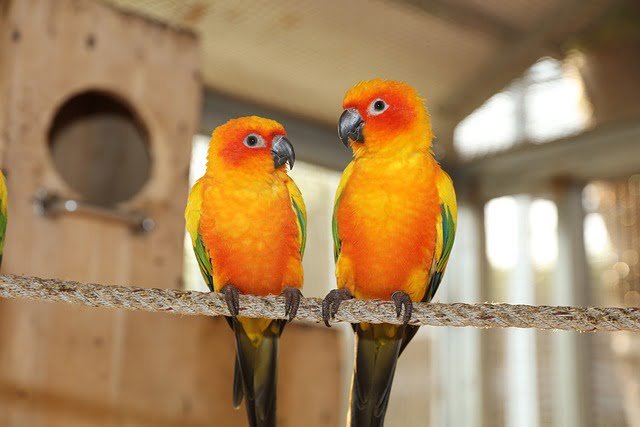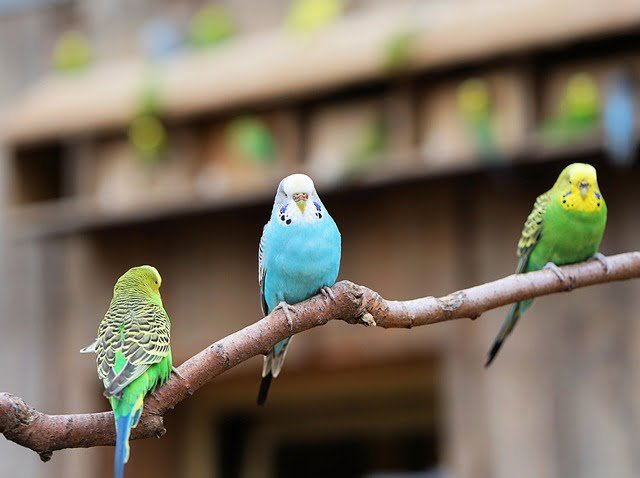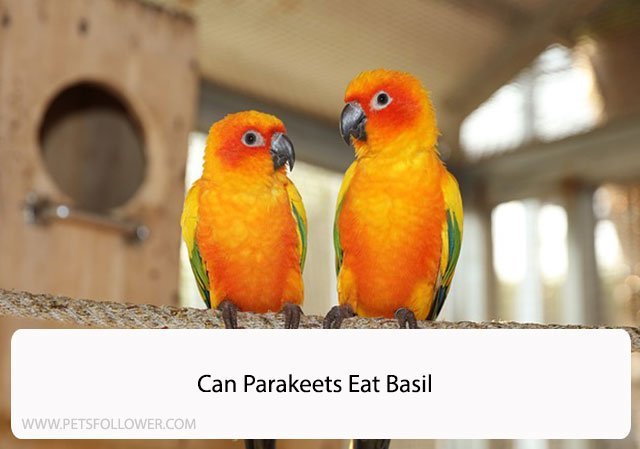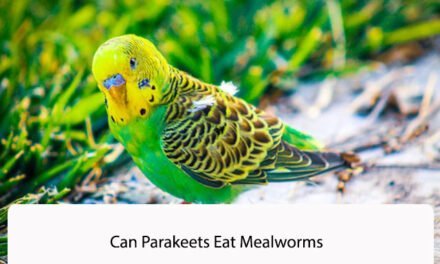Parakeets are delightful pets that are known for their playful personalities and beautiful plumage. As owners, we want to ensure that our feathered friends receive a balanced and nutritious diet. While seeds and pellets are the staple food for parakeets, it is always good to add some variety to their diet. One such food item that may pique your curiosity is basil. So, can parakeets eat basil?
Basil is a popular herb used in cooking and is known for its distinctive aroma and taste. It belongs to the mint family and is native to tropical regions of central Africa and Southeast Asia. Basil is rich in antioxidants and has anti-inflammatory properties, making it a healthy addition to human diets. However, when it comes to feeding basil to parakeets, there are a few things to consider. In this article, we will explore whether basil is safe for parakeets to eat and how to incorporate it into their diet.

Understanding Parakeets’ Diet
As pet owners, we want to make sure that our parakeets are getting the right nutrition. A balanced diet is essential for their overall health and well-being.
Parakeets are omnivores, which means they eat both plant and animal-based foods. In the wild, their diet consists of seeds, fruits, vegetables, and insects. As pets, we need to replicate this diet as closely as possible.
A well-balanced diet for a parakeet should consist of:
- High-quality seed mix: A good seed mix should contain a variety of seeds, including millet, canary seed, and sunflower seeds.
- Fresh fruits and vegetables: These should make up around 20% of their diet. Some good options include apples, carrots, broccoli, and spinach.
- Pellets: Pellets are a great source of essential vitamins and minerals. They should make up around 25% of their diet.
It’s important to note that parakeets should not be fed only seeds, as this can lead to nutritional deficiencies. Additionally, certain foods should be avoided, such as avocado, chocolate, and caffeine.
When introducing new foods to your parakeet’s diet, do so gradually to avoid digestive issues. Always provide fresh, clean water and make sure their food and water dishes are cleaned regularly.
In summary, a balanced diet is crucial for a parakeet’s health. By providing a variety of seeds, fresh fruits and vegetables, and pellets, we can ensure that our feathered friends are getting all the nutrients they need to thrive.
Basil in a Parakeet’s Diet
Nutritional Value of Basil
Basil is a herb that is commonly used in cooking, but did you know that it can also be a great addition to your parakeet’s diet? Basil is a good source of several essential vitamins and minerals that are important for your bird’s health. Here are some of the key nutrients that can be found in basil:
| Nutrient | Amount per 100g |
|---|---|
| Vitamin A | 2640 IU |
| Vitamin K | 414.8 µg |
| Vitamin C | 18 mg |
| Calcium | 177 mg |
| Iron | 3.17 mg |
| Magnesium | 64 mg |
As you can see, basil is a good source of vitamin A, which is important for maintaining healthy vision, and vitamin K, which is essential for blood clotting. It also contains calcium, which is important for strong bones, and iron, which is necessary for the production of red blood cells.
Health Benefits of Basil for Parakeets
In addition to its nutritional value, basil also has several health benefits for parakeets. Here are some of the ways that basil can help keep your bird healthy:
- Antioxidant properties: Basil contains compounds that have antioxidant properties, which can help protect your parakeet’s cells from damage caused by free radicals.
- Anti-inflammatory properties: Basil also has anti-inflammatory properties, which can help reduce inflammation in your parakeet’s body and prevent the development of chronic diseases.
- Immune system support: Basil contains compounds that can help support your parakeet’s immune system, which can help prevent infections and other illnesses.
Overall, basil can be a great addition to your parakeet’s diet. Just be sure to introduce it gradually and in small amounts to avoid any digestive issues.
How to Feed Basil to Parakeets
Introducing Basil to Parakeets
Basil is a fragrant herb that is safe for parakeets to eat. However, it is important to introduce new foods to your parakeet gradually to prevent digestive upset.
To introduce basil to your parakeet, start by offering a small piece of the herb. Observe your parakeet’s reaction and wait for a few hours to ensure that there are no adverse effects. If your parakeet eats the basil without any issues, you can gradually increase the amount over time.
Serving Recommendations
When serving basil to your parakeet, it is important to wash the herb thoroughly to remove any dirt or pesticides. You can offer fresh basil leaves or sprinkle chopped basil over your parakeet’s regular food.
It is recommended to serve basil in moderation as a treat rather than a staple food. Too much basil can cause digestive upset or diarrhea in some parakeets.
Here are some tips for serving basil to your parakeet:
- Offer small pieces of basil at first and gradually increase the amount over time.
- Wash the basil thoroughly before serving.
- Serve basil as a treat rather than a staple food.
- Monitor your parakeet for any signs of digestive upset or adverse reactions.
In conclusion, basil is a safe and healthy treat for parakeets when served in moderation. By introducing basil gradually and serving it in the right amount, you can provide your parakeet with a tasty and nutritious snack.

Potential Risks and Precautions
Overconsumption Risks
While basil is generally considered safe for parakeets, overconsumption can lead to health problems. Basil contains essential oils that can irritate the digestive system if consumed in large quantities. In addition, overconsumption of basil can cause vomiting, diarrhea, and digestive upset in parakeets.
To avoid overconsumption, we recommend limiting your parakeet’s intake of basil to small amounts as an occasional treat. A few leaves of basil once or twice a week should be sufficient.
When purchasing a bird toy, explore reputable pet stores or online retailers
offering a wide selection of bird toys, ensuring they are made from safe and non-toxic materials.
Possible Allergies
Some parakeets may be allergic to basil, just like humans can be allergic to certain foods. Symptoms of an allergic reaction in parakeets include difficulty breathing, swelling of the beak or face, and lethargy.
If you notice any of these symptoms after giving your parakeet basil, remove the basil from their diet immediately and consult with your veterinarian. It’s also a good idea to introduce new foods slowly and in small amounts to monitor your parakeet’s reaction.
In conclusion, while basil can be a healthy and flavorful addition to your parakeet’s diet, it’s important to keep in mind the potential risks of overconsumption and allergies. By following these precautions, you can safely incorporate basil into your parakeet’s diet as an occasional treat.
Conclusion
In conclusion, we have found that basil is safe for parakeets to consume in moderation. While basil does not provide significant nutritional value, it can be a healthy addition to a parakeet’s diet as a source of antioxidants and other beneficial compounds.
It is important to note that basil should only be given to parakeets in small amounts. Overfeeding basil or any other herb can lead to digestive issues and other health problems. Additionally, it is important to ensure that the basil is fresh and free from any pesticides or other harmful chemicals.
Overall, basil can be a tasty and healthy treat for parakeets when given in moderation and under the right conditions. As with any new food, it is important to introduce basil slowly and monitor your parakeet for any adverse reactions. With proper care and attention, basil can be a safe and enjoyable addition to your parakeet’s diet.

Frequently Asked Questions
What herbs can budgies safely eat?
Budgies can safely consume a variety of herbs, including basil, coriander, thyme, and parsley. However, it’s important to ensure that the herbs are fresh, clean, and free of any pesticides or other harmful substances.
Is fresh basil safe for budgies?
Yes, fresh basil is safe for budgies to eat in moderation. Basil is a great source of vitamins and minerals, and can provide a tasty and healthy addition to your bird’s diet. However, too much basil can cause digestive issues, so it’s important to offer it in small quantities.
Can budgies eat coriander leaves?
Yes, coriander leaves are safe for budgies to eat and can provide a variety of health benefits. Coriander is rich in antioxidants and can help improve digestion and boost the immune system. However, as with all herbs, it’s important to offer coriander in moderation and ensure that it’s fresh and free of any contaminants.
Can budgies eat thyme?
Yes, thyme is safe for budgies to eat and can provide a variety of health benefits. Thyme is rich in vitamins and minerals, and can help improve digestion and boost the immune system. However, as with all herbs, it’s important to offer thyme in moderation and ensure that it’s fresh and free of any contaminants.
Are basil seeds safe for budgies to eat?
Basil seeds are safe for budgies to eat in moderation, and can provide a variety of health benefits. Basil seeds are rich in antioxidants and can help improve digestion and boost the immune system. However, it’s important to ensure that the seeds are fresh and free of any contaminants, and to offer them in small quantities to avoid digestive issues.
What are some safe herbs for parakeets to consume?
In addition to basil, coriander, thyme, and parsley, parakeets can safely consume a variety of other herbs, including dill, oregano, and rosemary. However, as with all herbs, it’s important to offer them in moderation and ensure that they are fresh, clean, and free of any contaminants.





